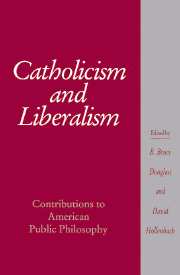Book contents
- Frontmatter
- Contents
- List of contributors
- Preface
- Introduction
- PART I HISTORICAL CONFLICTS AND DEVELOPMENTS
- PART II NEW ENCOUNTERS AND THEORETICAL RECONSTRUCTIONS
- PART III PRACTICES AND INSTITUTIONS
- 9 Catholicism and liberal democracy
- 10 Feminism, liberalism, and Catholicism
- 11 The family, liberalism, and Catholic social teaching
- 12 Rights of persons in the church
- Afterword: a community of freedom
- Index
12 - Rights of persons in the church
Published online by Cambridge University Press: 19 February 2010
- Frontmatter
- Contents
- List of contributors
- Preface
- Introduction
- PART I HISTORICAL CONFLICTS AND DEVELOPMENTS
- PART II NEW ENCOUNTERS AND THEORETICAL RECONSTRUCTIONS
- PART III PRACTICES AND INSTITUTIONS
- 9 Catholicism and liberal democracy
- 10 Feminism, liberalism, and Catholicism
- 11 The family, liberalism, and Catholic social teaching
- 12 Rights of persons in the church
- Afterword: a community of freedom
- Index
Summary
The Catholic church has recently adopted codes of law which for the first time include lists of rights and duties common to all Catholics. This is a significant development within the last decade, for it introduces within the church's law an echo of the Catholic social teaching on rights in society at large. For some time there have been appeals to the rights of Christians within the church occasioned by a variety of concerns, ranging from the concern of church officials to promote evangelization and the action of Catholics in the world, to the interests of individuals or groups who assert claims to the celebration of the Eucharist in a time of a shortage of celibate priests, or in regard to the role of women, or on behalf of academic freedom. Now even official codes of church law use rights language to describe the common status of church members.
This paper examines the adoption of this rights language in church law, and explores the extent to which it has been taken seriously in the system of canon law. Some preliminary cautions, however, are in order. First, in canon law the rights language itself tends to be somewhat ambiguous. It reflects an understanding that some rights are based in human nature (human rights), whether they are recognized by a given legal system or not. A specific legal system may recognize a variety of rights, some of which are human rights and others of which are the result of how the legal system itself is organized.
- Type
- Chapter
- Information
- Catholicism and LiberalismContributions to American Public Policy, pp. 296 - 322Publisher: Cambridge University PressPrint publication year: 1994



